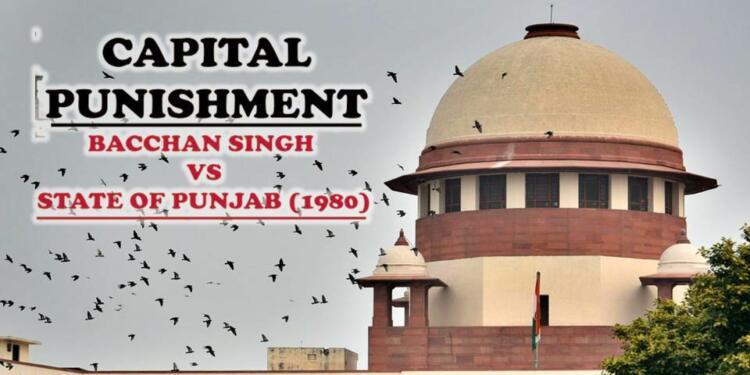Bachan Singh vs State Of Punjab case: Democracies are primarily centred on the five core values of right to life, liberty, economic freedom, and the pursuit of happiness. At the heart of this philosophy lies the cornerstone principle of the Gandhian ideology: “Hate the sin, not the sinner.” Consequently, the Supreme Court of India came up with the “doctrine of the rarest of the rare” in awarding capital punishment.
Doctrine of Rarest of Rare
The debate on capital punishment is not new to democracies around the globe. The Indian judiciary is of the view that punishment should be pursuant to deterrent, retributive, preventive, expiatory, compensatory, incapacitation, and utilitarian theories. Preference for one theory over the other is believed to be an unpleasant policy for awarding punishment. In consonance with this philosophy, the Supreme Court established the “Doctrine of the Rarest of the Rare” in the historic case of Bachan Singh and others vs State of Punjab and others.
Facts: Bachan Singh and others vs. the State of Punjab and others
The landmark judgement in Bachan Singh was pronounced by the Constitution Bench composed of Chief Justice Y.V. Chandrachud, Justice N.L. Untwalia, Justice P.N. Bhagwati, Justice R.S. Sarkaria, and Justice A.C. Gupta with a 4:1 split. The said criminal appeal before the Supreme Court arose out of the conviction of one Bachan Singh for the horrific murders of Desa Singh, Durga Bai, and Veeran Bai under Section 302 of the Indian Penal Code.
Issue in the Bachan Singh vs State Of Punjab Case
The prominent issue for the purpose of determination before the Bench was with respect to the constitutional validity of the death penalty under Section 302 of the Indian Penal Code read with Section 354 Subsection (3) of the Code of Criminal Procedure, 1973, as opposed to Article 14, Article 21 of the Constitution of India, and Article 6(1) of the International Covenant on Civil and Political Rights, adopted as the Stockholm Declaration.
Majority view pronounced by Justice Sarkaria
Adhering to the principle of natural justice, Hon’ble Justice Sarkaria proposed the “Doctrine of the Rarest of Rare Cases.” The Hon’able Justice held that whenever a person commits a murder in a gruesome, ridiculous, and heinous way that shakes the conscience of society, there is a strong possibility that the Bachan Singh vs State Of Punjab case would fall under the category of the rarest of the rare.
The apex court later laid down some of the instances where this doctrine can be applied. Firstly, when the accused puts the victim on fire; secondly, for gruesome and inhumane murder; and lastly, for mutilation of the victim’s body into pieces.
Not violative of Article 14
Justice Sarkaria took the view that every crime may superficially appear to be the same, but the facts and circumstances of a crime are widely different, making a distinction between murder and gruesome murder. Thus, the provision in Section 302 of the Penal Code as not violative of Article 14 of the Constitution on the ground that it confers on the judges an unguided and uncontrolled discretion in the matter of awarding capital punishment, citing Maneka Gandhi and Minerva Mills’ case.
Not Violative of Article 21
Justice Sarkaria observed that Clauses (1) and (2) of Article 6 of the International Covenant on Civil and Political Rights do not abolish or prohibit the imposition of the death penalty in all circumstances. All that they require is that, firstly, the death penalty shall not be arbitrarily inflicted, and secondly, it shall be imposed only for the most serious crimes in accordance with a law that shall not be ex post facto legislation. Thus, the requirements of these clauses are substantially the same as the guarantees or prohibitions contained in Articles 20 and 21 of our Constitution, citing Maneka Gandhi and Minerva Mills.
35th Report of the Law Commission
Justice Sarkaria took into consideration the 35th Report of the Law Commission, 1967, and the judgement made in the case of Jagmohan Singh, and recognised that the death penalty serves as a deterrent. However, it did go into the scientific findings for the purpose of this case.
Retributive Theory of Punishment
Justice Sarkaria was of the view that retributive measures are mandatory to ensure proper deterrence against heinous crimes that involve the barbaric intent of the accused. That is to say, neither the new interpretative dimensions given to Articles 19 and 21 by the Supreme Court in Maneka Gandhi and Charles Sobraj v. The Superintendent, Central Jail, Tihar, New Delhi, nor the acceptance by India of the International Covenant on Civil and Political Rights make any change in the prevailing standards of decency and human dignity. The International Covenant does not outlaw capital punishment for murder altogether.
Dissenting view of Justice P.N Bhagwati
The majority judgement received sharp criticism from Justice P.N. Bhagwati, who proposed that “reformation and rehabilitation” should be the principle and that the court must adhere to the principle of proportionality.
He highlighted that “murder most foul” cannot be distinguished from simple murder. He further pointed out the inability of the legislature to provide those exceptional instances in which death sentences may be regarded as proportionate.
Also Read: Shraddha Case: The legality of dating apps in India
Reformative Theory of Punishment
More so, he proposed that the judiciary refrain from a “tit for tat” method by adopting a “Retributive/Vengeance Theory of Punishment” and rather proceed with a softer approach following the “Reformative Theory of Punishment.”
Justice P.N. Bhagwati failed to appreciate how it should make any difference to the penalty whether the murder is a simple murder or a brutal one. Highlighting the fact, that merely because a murder is heinous, it cannot be said that the death penalty is proportionate to the offence.
Environment of Deterrence
On the issue of capital punishment being awarded to create an environment of deterrence, Justice P.N. Bhagwati cited the provision of the death penalty as an alternative punishment for murder as being unreasonable and not in the public interest as it sub-serves a penological goal.
Sentinel of the Constitution
Further, castigating the majority view that there are sociologists, legislators, judges, and jurists who firmly believe in the worth and necessity of capital punishment, Justice Bhagwati held that the “qui vive” to guard the fundamental rights guaranteed by the Constitution is vested on the judges, and they cannot shy away from their responsibilities by relying on public opinions.
Imposition of death penalty arbitrary and capricious
Further, Justice Bhagwati held that there is no uniform pattern of judicial behaviour in the imposition of the death penalty, and the judicial practise does not disclose any coherent guidelines for the award of capital punishment.
The judges have been awarding or refusing to award the death penalty according to their own scale of values and social philosophy, and it is not possible to discern any consistent approach to the problem in the judicial decisions, rendering the “special reasons” as arbitrary.
He stated unequivocally that there can be no equal protection without equal principles in the exercise of discretion and any form of arbitrariness, whether it is executive irrationality or judicial adhocism as radical prejudice against the Constitution.
Violation of Article 14 and Article 21
Moving ahead, Justice Bhagwati held the view that if judicial discretion is not guided by any standards or norms, it will degenerate into judicial caprice. He expressed his apprehension that an unregulated and unprincipled sentencing discretion in a highly sensitive area involving a question of life and death would clearly be arbitrary and hence violative of the equal protection clause contained in Article 14 and would also mitigate against Article 21 as interpreted in Maneka Gandhi’s case.
Non-compliance with International Standards
Justice Bhagwati took a rigid stance, saying that the judgement is regressive in its approach and has failed to take into consideration the international standards, citing Gregg v. Goergia of the US Supreme Court and Rex v. Miller of the Canadian Supreme Court.
To conclude the dissenting order dated May 9, 1980, which declared the death penalty provided under Section 302 of the Indian Penal Code read with Section 354 sub-section (3) of the Code of Criminal Procedure, 1973, as unconstitutional and violative of Articles 14 and 21
But, with a 4:1 split verdict, the majority view against the order of Justice Bhagwati upheld the validity of these sections and called them good law.
Support TFI:
Support us to strengthen the ‘Right’ ideology of cultural nationalism by purchasing the best quality garments from TFI-STORE.COM
Also Watch:
https://www.youtube.com/watch?v=76muz7j6cKQ
























